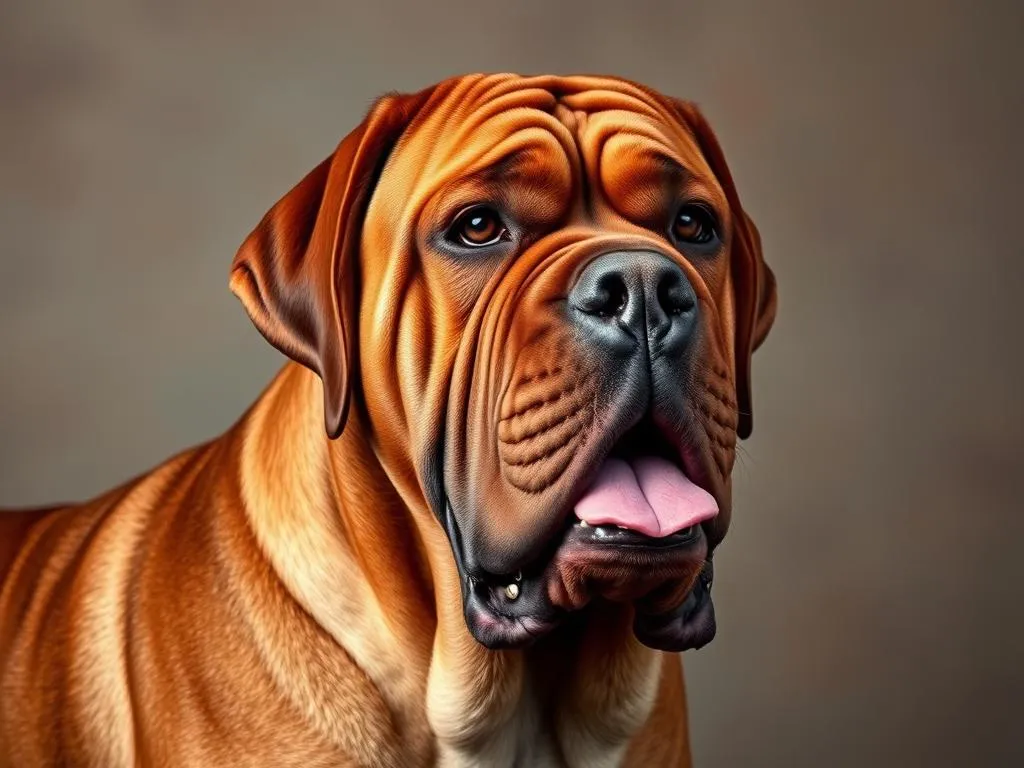
Introduction
The Dogue de Bordeaux, often referred to as the French Mastiff, is a breed characterized by its strong, muscular build and distinctive facial features. Originating from France, this breed has a rich history that intertwines with the cultural fabric of the nation. Known for their loyalty and protective nature, Dogue de Bordeaux dogs have been used in various roles, including working as guardians and companions.
Understanding different dog breeds is crucial for potential owners. Each breed comes with its unique traits and characteristics that influence companionship, work, and protection. This article aims to provide an in-depth analysis of the Dogue de Bordeaux, helping readers understand various aspects of owning and caring for this majestic breed.
History and Origins of the Dogue de Bordeaux
The Dogue de Bordeaux boasts ancient roots that can be traced back to several historical accounts. This breed is believed to have descended from ancient breeds such as the Molossus and the Alano, which were known for their strength and protective instincts. These ancestors were often used in battles and as hunting dogs, showcasing their versatility and strength.
In French culture, the Dogue de Bordeaux held significant importance. Historically, they were employed as working dogs, often used for guarding livestock and property. Their imposing presence helped deter intruders, making them valuable companions for farmers and landowners. Over the years, the breed has evolved, with changes in breeding practices leading to the modern characteristics we see today.
Breeders have focused on enhancing the breed’s physical attributes and temperament, ensuring that the Dogue de Bordeaux remains a loyal and protective companion. While the breed has undergone changes, its essence as a dedicated guardian has remained intact.
Physical Characteristics
The Dogue de Bordeaux is a large, powerful dog that commands attention with its impressive stature.
Size and Weight
Typically, male Dogue de Bordeaux dogs stand between 23 to 27 inches at the shoulder, while females range from 22 to 25 inches. In terms of weight, males usually weigh between 110 to 145 pounds, whereas females generally weigh between 99 to 130 pounds. Their size contributes to their formidable appearance and makes them excellent guardians.
Coat and Color
The breed features a short, dense coat that is relatively low-maintenance. Common colors include fawn and mahogany, often with a darker mask. The coat is smooth to the touch, which adds to the breed’s overall appeal.
Distinctive Features
One of the most striking aspects of the Dogue de Bordeaux is its facial structure. The breed has a broad head with a prominent stop, giving it a characteristic wrinkled appearance. Their loose skin around the face and neck adds to their charm and unique character. The body is muscular and well-proportioned, showcasing strength and athleticism.
Temperament and Behavior
The Dogue de Bordeaux is known for its loyalty and protective nature, making it an excellent family companion.
General Personality Traits
These dogs are deeply affectionate with their families and can form strong bonds with their owners. While they may be aloof with strangers, their protective instincts make them excellent watchdogs.
Socialization Needs
Early training and socialization are crucial for the Dogue de Bordeaux. Introducing them to various environments, people, and other animals helps ensure they develop into well-rounded dogs. Socialization reduces the risk of aggression and enhances their adaptability.
Common Behavioral Traits
Playfulness and intelligence are hallmarks of the breed. However, they can also exhibit stubbornness at times, requiring consistent and patient training methods. Engaging them in activities that challenge their minds, such as obedience training or interactive toys, can help keep them mentally stimulated.
Health Considerations
Like all breeds, the Dogue de Bordeaux is prone to certain health issues that potential owners should be aware of.
Common Health Issues
Some of the common health concerns include hip dysplasia, heart conditions, and skin problems. Regular veterinary check-ups can help catch these issues early, ensuring the dog’s overall wellbeing.
Lifespan and Longevity
The average lifespan of a Dogue de Bordeaux is around 5 to 8 years, which is relatively shorter compared to other breeds. Factors such as genetics, diet, and lifestyle can significantly influence their longevity.
Importance of Regular Veterinary Care
Routine veterinary care is essential for maintaining the health of a Dogue de Bordeaux. Regular check-ups, vaccinations, and preventive measures like parasite control can help manage potential health risks effectively.
Care and Maintenance
Owning a Dogue de Bordeaux requires commitment, particularly in terms of care and maintenance.
Daily Exercise Requirements
Despite their large size, these dogs don’t require excessive amounts of exercise. Daily walks of about 30 to 60 minutes, along with playtime in a secure yard, are generally sufficient to keep them healthy and happy.
Nutrition and Diet
Providing a balanced diet is crucial for maintaining the health of a Dogue de Bordeaux. High-quality dog food, rich in protein and essential nutrients, is recommended. It’s important to monitor their weight, as the breed is prone to obesity.
Grooming Needs
The grooming needs of the Dogue de Bordeaux are minimal due to their short coat. Regular brushing can help remove loose hairs and prevent matting. Bathing should be done as needed but be careful not to over-bathe, as it can strip the coat of its natural oils.
Training and Socialization
Training is an integral part of owning a Dogue de Bordeaux.
Basic Training Tips
Positive reinforcement methods tend to work best with this breed. Utilizing treats and praise during training sessions can encourage good behavior. Basic commands such as sit, stay, and come should be taught early on.
Importance of Socialization
Socialization is vital for a well-adjusted Dogue de Bordeaux. Exposing them to various experiences, sounds, and people can help reduce anxiety and fearfulness. Dog parks and obedience classes can serve as excellent environments for socialization.
Dealing with Behavioral Issues
Common challenges with the breed may include stubbornness and a strong will. Consistent training and an understanding of canine behavior can help mitigate these issues. If behavioral problems persist, consulting a professional trainer may be beneficial.
Living with a Dogue de Bordeaux
When considering a Dogue de Bordeaux, it’s essential to understand their living requirements.
Ideal Living Conditions
While they can adapt to apartment living, the Dogue de Bordeaux thrives best in homes with ample space. A secure yard is beneficial for exercise and play.
Compatibility with Families and Children
These dogs are generally good with children and can be very protective of their family. However, supervision is necessary, especially with young kids, to ensure safe interactions.
Time Commitment and Lifestyle Considerations
Owning a Dogue de Bordeaux requires a significant time commitment. Daily routines should incorporate exercise, training, and quality bonding time to ensure a happy and healthy dog.
Conclusion
In summary, the Dogue de Bordeaux is a breed with a fascinating history and a unique set of characteristics. Their loyalty, protectiveness, and affectionate nature make them exceptional companions. However, potential owners must be committed to responsible ownership, including proper training, health care, and socialization.
Having a Dogue de Bordeaux can bring immense joy and fulfillment, provided that owners are prepared for the responsibilities that come with this powerful and loving breed.
FAQs
What are the best training techniques?
Positive reinforcement is the most effective training method for a Dogue de Bordeaux. Using treats and praise encourages good behavior and fosters a strong bond between the dog and owner.
How much exercise does a Dogue de Bordeaux need?
A daily routine of 30 to 60 minutes of exercise, including walks and playtime, is generally sufficient for a Dogue de Bordeaux to maintain their health and happiness.
What are the breed’s most common health issues?
Common health issues in the Dogue de Bordeaux include hip dysplasia, heart conditions, and skin problems. Regular veterinary care can help manage and prevent these issues.









